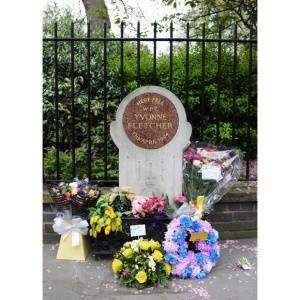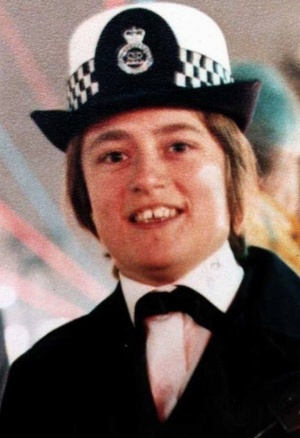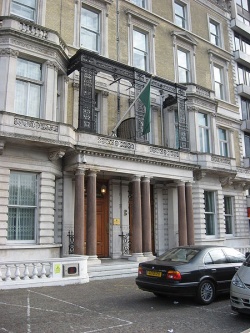Yvonne Fletcher, a 25-year-old woman police constable with the Metropolitan Police Service,
was shot and killed outside the Libyan People's Bureau in St James's
Square in London on 17 April 1984. WPC Fletcher's killer has never been
found.
On 19 November 2015, Commander Richard Walton, head of counter-terrorism at Scotland Yard, announced that a Libyan man had been arrested on suspicion of conspiracy to murder WPC Yvonne Fletcher three decades ago. The Libyan aged in his 50s was detained in south-east England and is now in custody. He is also suspected of money laundering offences. Two other Libyan nationals - a woman in her 40s and a man in his 30s - were also arrested on Thursday on suspicion of money laundering. The Met is offering a reward of up to £50,000 for information about the killing, as part of a global social media appeal to identify others involved. Commander Walton said:
On the day of her death, WPC Fletcher was one of a detachment of
thirty officers sent to the Libyan Embassy, known as the People's Bureau
and located at 5 St James's in London, to monitor a demonstration by
Libyan dissidents opposed to the rule of Muammar Gaddafi.
This particular demonstration was organised by the Libyan National
Salvation Front (LNSF), and was in protest at the execution of two
students who had criticised Gaddafi in Tripoli.
Gaddafi loyalists at the People's Bureau had warned the police that they intended to mount a counter-demonstration. About 75 protestors arrived by coach from the North of England for the demonstration, and the police kept them and the loyalists apart by the use of crowd control barriers. Loud music was played from the bureau in an apparent attempt to drown out the shouts of the protestors.[4]
The UK Government eventually resolved the incident by allowing the Embassy staff to depart the Bureau and then expelling them from the country. Britain then broke off diplomatic relations with Libya.
Robin Cook replied:
On 24 February 2004, the Today Programme on BBC Radio 4 reported that the new Libyan prime minister, Shukri Ghanem, had claimed that his country was not responsible for her murder (nor for the Lockerbie bombing). Ghanem said that Libya had made the admission and paid compensation in order to bring 'peace' and an end to international sanctions.[9]
In June 2007, detectives from Scotland Yard were able to interview the chief Libyan suspect for the first time, following normalisation of political ties with that country.[14] Detectives spent seven weeks in Libya interviewing both witnesses and suspects. Fletcher's mother, Queenie, described these developments as "promising".
In February 2009, Queenie Fletcher suggested that Abdelbaset al-Megrahi, who at the time was appealing against his conviction for the Lockerbie bombing, should be moved to a prison in Libya, on condition that the Libyan government co-operates with Scotland Yard detectives investigating her daughter’s murder. Mrs Fletcher said:
In September 2011, Yvonne's former fiancé John Murray travelled to Libya to find out whether the change of regime there had brought the prospect of justice for WPC Fletcher any closer. Accompanied by BBC reporter Allan Little, Murray went in search of Matouk Mohamed Matouk, who from documents recently recovered from government offices, had been named as a suspect. They spoke to the National Transitional Council's vice-Chairman Abdel Gogha who told them:
"PC Yvonne Fletcher shooting: Libyan man arrested in UK"
"Fletcher friend's 27-year quest for justice"
"Statement by Margaret Thatcher on US bombing of Libya"
ISBN 978-0886876784 "Bloody business: an anecdotal history of Scotland Yard" - page=255
"Fiancé is witness". BBC News.
"Do Not Forget Yvonne Fletcher"
"Gaddafi's 'disgust'"
"Robin Cook: 'If the two men are innocent they have nothing to fear from Scottish justice'"
"PM Ghanem says Libya not responsible" - BBC Radio 4, 24 February 2004
"Murder In St James's" 2-part documentary
"Murder in St James's" Fulcrum TV trailer
"Forensic evidence disputes that Fletcher was killed from second floor of Libyan embassy"
"Libya: Exiled Opposition"
"Yvonne Fletcher: the net closes in" - The Guardian 24 June 2007
"Mum of shot WPC calls for Megrahi swap" - The Sunday Times 1 February 2009
"Yvonne Fletcher: Tories demand Government answers over Libyan killers" - The Daily Telegraph 16 October 2009
"Fletcher friend's 27-year quest for justice"
On 19 November 2015, Commander Richard Walton, head of counter-terrorism at Scotland Yard, announced that a Libyan man had been arrested on suspicion of conspiracy to murder WPC Yvonne Fletcher three decades ago. The Libyan aged in his 50s was detained in south-east England and is now in custody. He is also suspected of money laundering offences. Two other Libyan nationals - a woman in her 40s and a man in his 30s - were also arrested on Thursday on suspicion of money laundering. The Met is offering a reward of up to £50,000 for information about the killing, as part of a global social media appeal to identify others involved. Commander Walton said:
- "The day Yvonne was shot remains one of the saddest and darkest days in the history of British policing. We have never lost our resolve to solve this case and to bring to justice those who conspired to commit this act of murder."[1]
Contents
Official Narrative
WPC Yvonne Fletcher's death resulted in an 11-day police siege of the Embassy, from where the fatal shot was fired. The shooting resulted in the expulsion of the Embassy staff and the breakdown of diplomatic relations between the United Kingdom and Libya.[2] Fletcher's murder became a major factor in Prime Minister Margaret Thatcher's decision to allow US President Ronald Reagan to launch the USAF bombing raid on Libya in 1986 from American bases in Britain.[3]Noisy protests
The Libyan People's Bureau, 5 St James's Square, London
Gaddafi loyalists at the People's Bureau had warned the police that they intended to mount a counter-demonstration. About 75 protestors arrived by coach from the North of England for the demonstration, and the police kept them and the loyalists apart by the use of crowd control barriers. Loud music was played from the bureau in an apparent attempt to drown out the shouts of the protestors.[4]
Shooting
The officers with WPC Fletcher at the time included her fiancé PC John Murray,[5] who described what happened:- "Yvonne was the only female officer on duty outside the Embassy and let's not forget she was just over 5 foot tall. We were facing the crowd, our backs towards the Embassy when at about 10:30 hours there was a loud bang. I thought someone had thrown a firework, then I looked to my right and saw Yvonne fall to the ground, after a few seconds I ran over to her, we were only feet apart, she was writhing around in pain, but I did not know what had happened, other officers joined me and I glanced at the crowd as I cradled Yvonne's head, I saw several of the demonstrators on the ground covered in bloodand they were all screaming, then they all scattered.
- "Suddenly all went quiet, the Square seemed to be deserted, Yvonne was lying in the road, I was cradling her head and other officers were around us. It was then I realised she had been shot.
- "An ambulance arrived and Yvonne was placed in the rear. I went with her, also in the ambulance were several of the most seriously wounded demonstrators. During the journey, Yvonne said to me her tummy was hurting. I used the medic scissors to cut her skirt open, it seemed to relieve the pressure. I said to Yvonne I didn't know what had happened, but don't worry I promise we will get whoever did this, she seemed to smile, I knew she understood.
- "At the hospital she was seen immediately and I was placed in another room. I was later told by the doctor that she was being taken for surgery but she should be OK. About 1 hour later I was told she had died."[6]
Siege
Following the shooting, the Embassy was surrounded by armed police for eleven days, in the longest police siege in London's history. Meanwhile, Gaddafi expressed 'disgust' that his diplomats were not being permitted diplomatic immunity, and Libyan soldiers surrounded Britain's Embassy in Tripoli in response.[7]The UK Government eventually resolved the incident by allowing the Embassy staff to depart the Bureau and then expelling them from the country. Britain then broke off diplomatic relations with Libya.
Subsequent events
At a press conference on 5 April 1999, Foreign Secretary Robin Cook was asked (in relation to the Lockerbie breakthrough): "How quickly do you anticipate relations between the UK and Libya to get back to normal?"Robin Cook replied:
- The United Nations sanctions will now be suspended, and after 90 days will be lifted depending on Kofi Annan's support; that will resolve the international sanctions on Libya.
- The United Kingdom does of course also have issues of its own bilateral concerns with Libya, notably the case of the murder of WPC Fletcher. We have said that we would wish to address those issues, and we hope to achieve cooperation with Libya in resolving those issues - hopefully with some good reasonable speed now that we have resolved the Lockerbie case.[8]
On 24 February 2004, the Today Programme on BBC Radio 4 reported that the new Libyan prime minister, Shukri Ghanem, had claimed that his country was not responsible for her murder (nor for the Lockerbie bombing). Ghanem said that Libya had made the admission and paid compensation in order to bring 'peace' and an end to international sanctions.[9]
Controversy
The Official Narrative official view that WPC Fletcher was fired upon and killed by someone in the Libyan Embassy has been disputed by a number of experts, including army ballistics officer Lt-Col George Styles and Home Office pathologist, Hugh Thomas. Prime Minister Tony Blair was questioned on this subject by MP Tam Dalyell in Parliament on 24 June 1997. The Guardian of 23 July 1997 reported a parliamentary speech by Dalyell concerned mainly with the Lockerbie bombing, but also referring to Fletcher's murder:"With the agreement of Queenie Fletcher, her mother, I raised with the Home Office the three remarkable programmes that were made by Fulcrum, and their producer, Richard Bellfield, called Murder In St. James's.[10][11] Television speculation is one thing, but this was rather more than that, because on film was George Styles, the senior ballistics officer in the British Army, who said that, as a ballistics expert, he believed that the WPC could not have been killed from the second floor of the Libyan embassy, as was suggested.Participants who appeared in Channel 4's Dispatches documentary entitled "Murder In St James's" highlighted such issues as the velocity of the bullet and the angle at which it entered Fletcher's body. Lt-Col Styles stated that a high velocity bullet from a Sterling submachine gun would have passed straight through her body at an angle of 15°, and Hugh Thomas rebutted evidence given by Ian West, the pathologist at the inquest, that the 60° angle of entry of the bullet could be explained by Fletcher's turning to the right or left. The film went on to allege that the anti-Gaddafi organisation Al Burkan, which was allegedly funded by the Reagan White House, had obtained a gun from the Hein terrorist group in West Berlin, and used it to kill Fletcher with a single shot from the sixth floor penthouse at 3 St James's Square - the building adjacent to the Embassy. According to the film, the head of Al Burkan, Ragab Zatout, planned to overthrow Gaddafi and seize control of Libya's oil wealth after the severing of diplomatic relations, but his coup attempt on 8 May 1984 was thwarted by the Libyan army. [13]
"Also on film was my friend, Hugh Thomas, who talked about the angles at which bullets could enter bodies, and the position of those bodies. Hugh Thomas was, for years, the consultant surgeon of the Royal Victoria hospital in Belfast, and I suspect he knows more about bullets entering bodies than anybody else in Britain. Above that was Professor Bernard Knight, who, on and off, has been the Home Office pathologist for 25 years. When Bernard Knight gives evidence on film that the official explanation could not be, it is time for an investigation."[12]
Murder investigation
Once diplomatic relations had been restored in 1999, officers from the Metropolitan Police went to Libya on a number of occasions to pursue their investigations into her murder.In June 2007, detectives from Scotland Yard were able to interview the chief Libyan suspect for the first time, following normalisation of political ties with that country.[14] Detectives spent seven weeks in Libya interviewing both witnesses and suspects. Fletcher's mother, Queenie, described these developments as "promising".
In February 2009, Queenie Fletcher suggested that Abdelbaset al-Megrahi, who at the time was appealing against his conviction for the Lockerbie bombing, should be moved to a prison in Libya, on condition that the Libyan government co-operates with Scotland Yard detectives investigating her daughter’s murder. Mrs Fletcher said:
"I know he is ill and I think he should be returned to a prison in Libya so his family can visit him. The appeal could still go ahead in Scotland, but he could stay in prison in Libya. It’s got to be a fair exchange, so Yvonne’s case can be closed. I’d like the police here to be given permission to interview whoever they’ve got to interview in Libya and see whoever they need to for someone to be brought to trial." [15]In October 2009 the Daily Telegraph revealed that the Crown Prosecution Service had been told by an independent prosecutor that there was sufficient evidence to prosecute two Libyans. A report from April 2007 concluded that the two men, who are now senior members of the Libyan regime played an "instrumental role" in the killing.[16]
In September 2011, Yvonne's former fiancé John Murray travelled to Libya to find out whether the change of regime there had brought the prospect of justice for WPC Fletcher any closer. Accompanied by BBC reporter Allan Little, Murray went in search of Matouk Mohamed Matouk, who from documents recently recovered from government offices, had been named as a suspect. They spoke to the National Transitional Council's vice-Chairman Abdel Gogha who told them:
- "Matouk is wanted for crimes against the Libyan people. This includes the murder of Yvonne Fletcher because it was committed from the Libyan Embassy. It is also a crime against Libyans. He will be prosecuted for this in Libya."[17]
Call for Public Inquiry
On 17 April 2014, marking the 30th anniversary of WPC Yvonne Fletcher's murder, the following petition for a Public Inquiry was announced on Facebook:- This month it will mark the 30th anniversary the murder of WPC Yvonne Fletcher shot while standing opposite the Libyan embassy in St James's Sq. Diminutive in height, but large on bravery and character, Yvonne Fletcher was only accepted at 5’ 2” in the Met Police because of sheer, irrepressible enthusiasm and commitment. Are our memories so careless and short for someone who paid the ultimate price as a public servant? WPC Fletcher’s memory deserves the proper dignity and respect of a more thorough enquiry into her death. The controversy surrounding discrepancies of evidence and ballistics in particular suggest we have not served her memory well. The case should never have been closed without finding out beyond all shadow of doubt, who was responsible. We must call now for the case to be reopened and a Public Inquiry established. Please sign and share this petition.[18]
Related Documents
| Title | Image | Type | Publication date | Author(s) | Description |
|---|---|---|---|---|---|
| Terminal Velocity |  | article | 1997 | David Guyatt | Presents evidence that the shots which killed PC Yvonne Fletcher were not fired from the first floor of the Libyan embassy and that other aspects of the official narrative are anomalous. It refers to the work of Joe Vialls. |
| Yvonne Fletcher - Death in St James | webpage | 15 January 1996 | Joe Vialls | ||
| Yvonne Fletcher - Death in St James-2 | webpage | 15 January 1996 | Joe Vialls |
References
External links
- BBC News (March 25, 2004), "Timeline: WPC Yvonne Fletcher"
- "The Murder of Policewoman Yvonne Fletcher" Joe Vialls on the holes in the official story
- National Police Memorial image of the Fletcher memorial
- The Guardian (July 23, 1997), speech by Tam Dalyell on Lockerbie and Fletcher's murder
- "Who Killed Police Constable Yvonne Fletcher?" Facebook Group
Footage
- Dispatches - Murder In St. James' Channel 4 Dispatches investigation (since removed by YouTube)
- BBC News footage of the family reaction
- BBC footage of the funeral
- "Yvonne Fletcher murdered by our Spooks"
Facts about "Yvonne Fletcher"
| Born on | 1959 + |
| Constitutes | Murder + and Deep event + |
| Description | Yvonne Fletcher was shot dead while on duty during a protest outside the Libyan embassy on 17 April 1984, cue for the breakdown of diplomatic relations between the UK and Libya. + |
| Died on | 17 April 1984 + |
| Display docType | WikiSpooks Page + |
| Display image | File:Yvonne Fletcher 1.jpg + |
| Display lifespan | 1959 - 17 April 1984 + |
| Has fullPageName | Yvonne Fletcher + |
| Has fullPageNamee | Yvonne_Fletcher + |
| Has image |  + + |
| Has image2 | File:Yvonne Fletcher 1.jpg + |
| Has objectClass | Person + |
| Has objectClass2 | Person + |
| Has revisionSize | 17,226 + |
| Has revisionUser | Patrick Haseldine + |
| Has wikipediaPage | https://en.wikipedia.org/wiki/Murder_of_Yvonne_Fletcher + |
| Has wikipediaPage2 | https://en.wikipedia.org/wiki/Murder_of_Yvonne_Fletcher + |
| Victim of | Murder + |

No comments:
Post a Comment